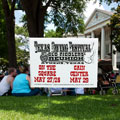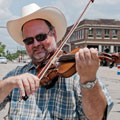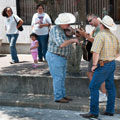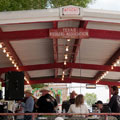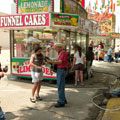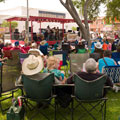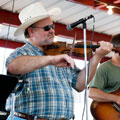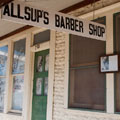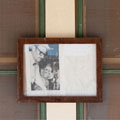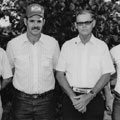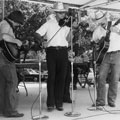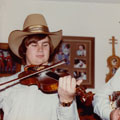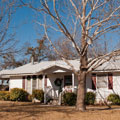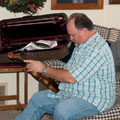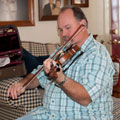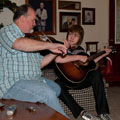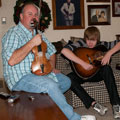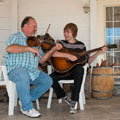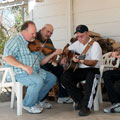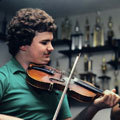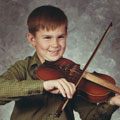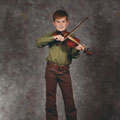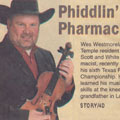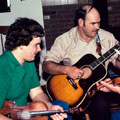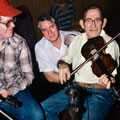Howard Dee "Wes" Westmoreland
Fiddler from Gustine, TX
Media
Excerpt from "Texas Style." Directed by Alan Govenar and Bruce Lane. Produced by Documentary Arts, Inc. 1985. Copyright 2012 Documentary Arts, Inc.
Excerpt from "Texas Style." Directed by Alan Govenar and Bruce Lane. Produced by Documentary Arts, Inc. 1985. Copyright 2012 Documentary Arts, Inc.
Wes Westmoreland III playing guitar with his son Tanner on fiddle. December 20, 2010. Video by Alex Govenar. Edited by Jason Johnson-Spinos. Copyright 2012 Documentary Arts, Inc.
- 00:00
- 00:00
Wes Westmoreland answers the question "What does the tradition of fiddle playing mean to you?" Interview with Alan Govenar. Recorded by Alan Govenar. Lamkin, Texas, 2010.
- 00:00
- 00:00
Wes Westmoreland talks about his first fiddle. Interview with Alan Govenar. Recorded by Alan Govenar. Lamkin, Texas, 2010.
- 00:00
- 00:00
Wes Westmoreland talks about his grandfather helping him learn the fiddle. Interview with Alan Govenar. Recorded by Alan Govenar. Lamkin, Texas, 2010.
- 00:00
- 00:00
Wes Westmoreland talks about playing in a country band with his grandfather. Interview with Alan Govenar. Recorded by Alan Govenar. Lamkin, Texas, 2010.
- 00:00
- 00:00
Wes Westmoreland talks about fiddle competitions. Interview with Alan Govenar. Recorded by Alan Govenar. Lamkin, Texas, 2010.
- 00:00
- 00:00
The Westmorelands play "Allentown Polka." Recorded by Alan Govenar. Gustine, Texas, 1984.
- 00:00
- 00:00
The Westmorelands play "Dill Pickle Rag." Recorded by Alan Govenar. Gustine, Texas, 1984.
- 00:00
- 00:00
The Westmorelands play "Fort Worth Rag/Pig Ankles." Recorded by Alan Govenar. Gustine, Texas, 1984.
- 00:00
- 00:00
The Westmorelands talk about the funny names of songs. Interview with Alan Govenar. Recorded by Alan Govenar. Gustine, Texas, 1984.
- 00:00
- 00:00
The Westmorelands talk about fiddling as a family pastime. Interview with Alan Govenar. Recorded by Alan Govenar. Gustine, Texas, 1984.
FOR THE TEACHER
Introduction
In 1999 Wes Westmoreland left his career as a professional musician touring with country music stars to become a pharmacist and be home with his family. He is still very active in fiddling as a musician, contest judge, and teacher and in passing his knowledge on to his children, a sixth generation of family musicians.
In the 1985 radio clip, we join a Memorial Day Westmoreland family reunion and hear members of an older generation describe how music was always a part of their lives. We also hear Wes’s grandfather Bus play fiddle and define Texas-style fiddling. In the 1985 film clip, we see Wes when he was just out of college and his cousin Robin when she was fourteen. As they listen to the radio clip and view the film (see Resources), students will hear Texas-style fiddle playing. They should observe how the Westmorelands learn music; how the young people interact with elders; the preparations for a family reunion; and the musicians’ virtuosity.
In the 2010 video we see Wes Westmoreland playing the fiddle with his teenaged son Tanner, accompanied by his uncle Eugene Westmoreland.
Objectives
Students may:
- Improve listening skills and note taking
- Discover Texas-style fiddling
- Investigate virtuosity and mastery
- Learn that traditions change over time
- Explore how people learn traditionally from members of a cultural group, such as a family
- Examine the intersections of traditional, academic, and popular culture
- Consider their own traditions and how families pass along knowledge and skills
- Compare the Westmoreland reunion with a celebration in their own community
Big Ideas
Virtuosity
- Learning traditionally from a cultural group—family members in the case of the musical Westmorelands—is informal, but that does not mean that traditional learning is easy. Hard practice and persistence over many years go into achieving mastery and virtuosity.
- Virtuosity invites improvisation and instills pride.
- Virtuosity and personal expression are important in fiddle contests.
Cultural Dynamics
- Traditional culture is not static but changes over time. Wes’s fiddle style is based on his grandfather’s Texas style, which in turn was based on his father’s old-time fiddle style, but Wes improvises and puts his own mark on tunes.
- Traditional culture often seamlessly intersects with popular culture and academic culture. Wes learned traditionally from childhood how to play fiddle, but he also studied music in college, where he played in the university jazz band, and then he toured with major popular recording artists.
- Texas-style fiddling evolved during an era when dances were a vital part of family and community gatherings. As dances faded out of fashion, fiddling contests became the most prominent venue for fiddlers around the state.
Family Traditions
- The Westmoreland family has made music an important part of family life. Not every family can claim six generations of fiddlers, but every family is imbued in traditions from names to celebrations, passing along family stories, skills, and beliefs through sayings, manners, and everyday life.
- Family sayings often express family beliefs and values. For example, the Westmorelands’ sayings sum up how traditional music is at the core of their family folklore: “Music cures what ails you.” “If you don’t put fire in it, it ain’t worth playing.” “It’s heart music.” “Songs are stories, not just a bunch of notes.” “You put two Westmorelands together and one of them has got a fiddle, and that other one is going to have a guitar.”
Materials
Wes Westmoreland’s story and photos
Radio clip
Film clip
Everyday Music Field Notes
Traditions Venn Diagram
Everyday Music Interview Worksheet
Release Form
Time Required
1-2 class periods
Subjects
Texas history, social studies, English language arts, music
Preparation
Review Wes Westmoreland’s story and the media clips. Choose Big Ideas that you find relevant to your curriculum and your students. Copy Everyday Music Field Notes and other worksheets students will need and cue the audio and video clips.
Class Discussion
Students may read the story, listen to the audio story, and view the video clip independently, in groups, or as a class. Using the Everyday Music Field Notes worksheet will help them focus more closely. In a class discussion, raise some of the Big Ideas above, depending upon your curriculum and students’ needs and grade level. Here are questions to spark discussion:
- How does Texas-style fiddling differ from other styles?
- What does it mean to master a skill?
- Why do traditions change over time?
- How do traditional, academic, and popular culture intersect in Wes’s music? In your traditions?
- How do families pass along knowledge, skills, and traditions?
- What are sayings in your family? How do they reflect your family’s beliefs and values?
- How does a celebration in your family or community compare with the Westmoreland family reunion?
Suggested Activities
Students may work independently or collaboratively to:
Research Texas-style fiddling for an oral report to the class, including audio samples (see Resources).
Use the Everyday Music Interview Worksheet to interview family members and other adults about their music experiences as young people. Share findings in class discussion that might include how music contributes to a sense of place and may differ across generations. Analyze findings by compiling data from interviews in charts, graphs, or timelines.
Create a poster advertising a fiddling contest.
Organize a classroom music contest. Be sure to record it.
Write a poem about virtuosity—what it means to Wes Wesmoreland, to you, or to someone in your life.
Document a celebration such as a reunion, birthday party, or parade. Use your notes, photos, sketches, and audio or video recording in a multimedia class presentation.
Collect family sayings for a class publication or Web page.
Assessment Strategies
Discussions
Field
notes
Venn
diagrams
Reports
Interviews
Charts,
graphs, timelines
Posters
Music
contest
Poetry
Family
sayings publication or Web page
Vocabulary
academic
culture
family
sayings
fiddle
contests
improvisation
mastery
popular
culture
reunions
Texas-style
fiddling
traditional
culture
virtuosity
Standards
Analyze information
Use and create primary sources
Resources
Websites
Texas Folklife Resources Texas Style Fiddling Curriculum
Films
Texas Style. Directed by Alan Govenar and Pacho Lane, 28 min., 1985. View online at www.folkstreams.net. Also available on DVD from www.documentaryarts.org.
